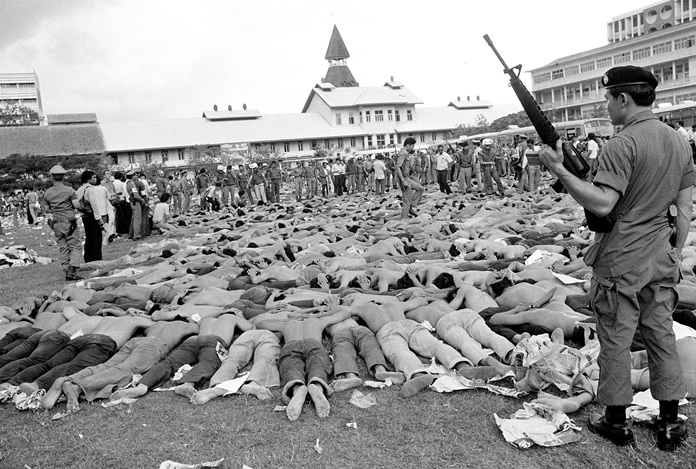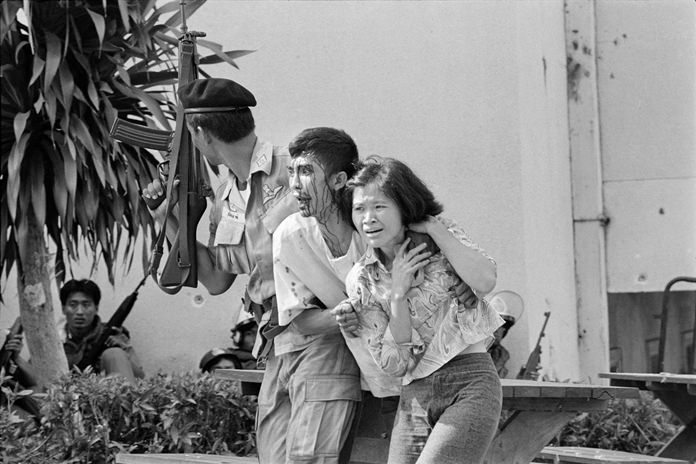Bangkok (AP) – Editor’s Note: Associated Press Photographer Neal Ulevich won the Pulitzer Prize for his photos of the suppression of a left-wing student protest at Bangkok’s Thammasat University on Oct. 6, 1976, and the brutal lynchings in its wake. Ulevich, then 30, arrived as a night of tension at the campus broke into a full-scale assault by paramilitary police on thousands of trapped and defenseless students.

Even with experience covering the Vietnam War – he was on one of the last helicopters out when the American presence ended with the communist takeover in April 1975 – Ulevich was stunned by the scale of the violence.
After winning the Pulitzer, he said his happiness “must be tempered with grim memories of the day. If there is any value in the pictures it is that they may have made some people pause and think about the wider issues such as hatred and violence.”
Ulevich wrote this first-person account, which the AP published soon after the massacre.
___
In a real riot no one knows you’re there. So as gunfire crackled over the campus of Bangkok’s Thammasat University Wednesday morning, I pushed my way through an angry sea of rightists and found a hole in the high metal fence surrounding the campus.
I paused momentarily while Boy Scouts pushed through the fence the body of a soldier with a chest wound. I jumped through.
The police were on the attack and the rightists were cheering their support. Troops armed with M-16 rifles were spraying wild fire across a quadrangle, shattering classroom windows and nicking holes in the walls.
With some Indochina combat coverage behind me, I could hear that more than 90 percent of the fire was going in one direction – toward the students. Occasionally it seemed a round came back.
On the quadrangle, troopers worked their way toward classrooms.

Some of the troopers tossed hand grenades through the windows. The “garrumph” of a grenade going off was followed by a puff of smoke and the tinkle of showering glass. Then the recoilless rifle crew moved up.
It wasn’t immediately clear why the border patrol police were there, or why they thought they needed an armor-piercing antitank weapon to conquer students. The two-man crew moved forward, followed by a shaggy right-winger carrying a box of ammunition. They blasted more classrooms.
A few minutes later, about 9:30 a.m., the battle seemed over.
Students began to pour out of campus buildings, some wounded. I began to move forward, 50 yards behind the soldiers. I began to feel apprehensive, just as I did in Vietnam when crossing open ground. And with good reason. The shooting began again.
The students threw themselves to the ground – I did, too – as the Thai police emptied more thousands of rounds into the classrooms. The fire slackened and the students got up.
I reached the nearest classroom building.
At the door, students were running out, diving to their hands and knees and crawling past soldiers who told them to take off their shirts, and coeds their blouses. Slow performance earned a kick.
A grenade went off in a classroom above us, showering troops and their captives with glass and plaster. The students crawled toward the center of the quadrangle to lie in the hot sun.
I was joined by a German reporter who speaks Thai, and we walked out through the gate.
Then we were out on the street – close by the pleasant green trees that surround the Pramaine Ground site of Bangkok’s colorful weekend fair. But then we saw the angry swarm of Thais around two of those trees and their anger was white hot. I saw the body of a dead student hanging from one tree. The scene was being repeated just a few feet away.
I don’t know how much earlier the students had been lynched – probably just a few minutes – but enraged rightists felt robbed by death and continued to batter the bodies.
Other Thais who witnessed the 1973 student riots here said the earlier uprising, which left 70 dead, never evoked the brutality or hatred of Wednesday’s attack on the students.
No one had seen me. I had wandered throughout and taken pictures unmolested. But I had seen enough, and left.




